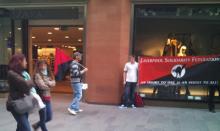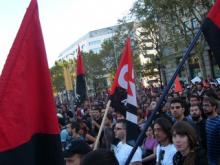Postal workers - taking no shit
In 2000, over half the strike days in Britain were in the Post Office. Most were unofficial. The run-up to the New Year saw plenty of direct action, with royal mail workers walking out across Britain. In particular, Mersyside postal workers weren't afraid to show their anger at management tactics. Bootle were out, which spread to Liverpool, while Frodsham (30 staff) came out in November. Then West Derby in Liverpool (70 staff) were out between Christmas and New Year.

